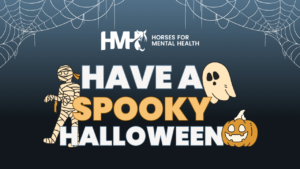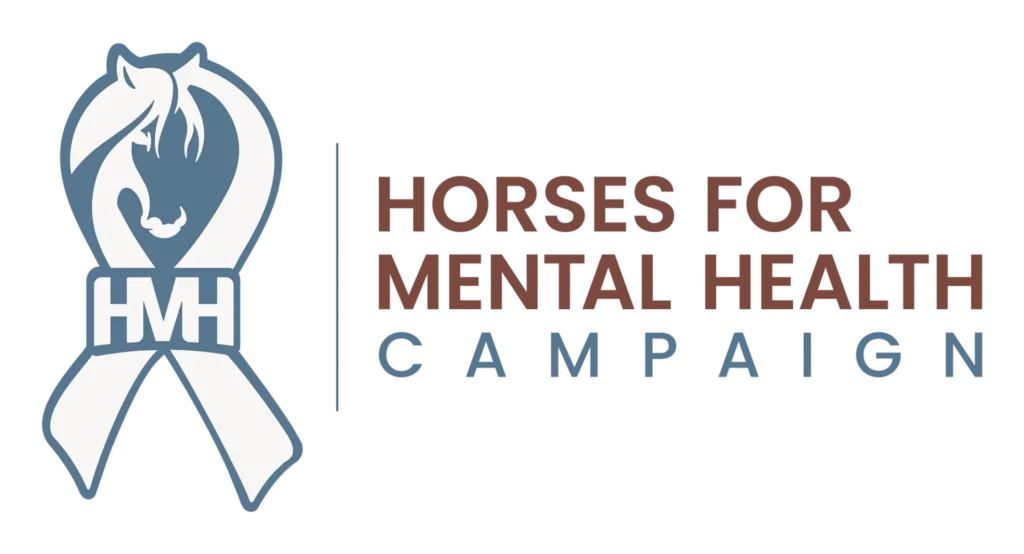Horses for Mental Health is dedicated to promoting open conversations to break the stigma surrounding depression. Depression affects approximately 280 million people globally, including 5% of adults, and is about 50% more common in women than men. Despite effective treatments, around 60% of those affected by depression do not seek professional support, partly due to stigma (WHO, NIH). Learning more about this common condition is critically important—depression could affect you or someone close to you, and taking action to educate yourself on this issue now can make a difference.
Despite growing awareness, many still find it challenging to discuss their experiences openly due to stigma and fear of judgment. This October, to kick off National Depression Awareness Month, we’re shedding light on the realities of depression, the importance of support, and how we can all foster a compassionate environment for those affected.
What is Depression?
Depression is more than just feeling down. It is a serious mental health disorder that affects how a person thinks, feels, and behaves, often making everyday activities overwhelming. Symptoms include persistent sadness, loss of interest in activities, changes in appetite, sleep disturbances, and thoughts of self-harm. Despite its prevalence, many do not seek help due to access barriers like cost and lack of local mental health services.
Understanding the Different Types of Depression
Depression isn’t one-size-fits-all. It can manifest in various forms, each with its own challenges. Understanding the different types of depression can help us provide better support to those affected.
- Major Depressive Disorder (MDD): Characterized by persistent sadness and a lack of interest in activities that were once enjoyable. This type of depression can last for weeks or even months, affecting daily functioning.
- Persistent Depressive Disorder (PDD): Also known as dysthymia, this form of depression is less severe but more chronic. People with PDD experience a depressed mood for at least two years, accompanied by low energy, poor self-esteem, and difficulty concentrating.
- Perinatal Depression: Perinatal depression occurs during pregnancy or after childbirth and includes feelings of intense sadness, anxiety, and changes in energy, sleep, and appetite. Over 10% of pregnant or postpartum women experience depression. This condition poses risks for both mother and child but is treatable. Postpartum depression specifically refers to depression after childbirth, while perinatal depression encompasses both pre- and post-birth experiences. Approximately one in seven women experience this serious condition.
- Depression with Psychosis: Involves severe depression along with some form of psychosis, such as delusions or hallucinations.
- Bipolar Disorder: Bipolar disorder, previously known as manic depression, is a mental health condition characterized by intense mood swings. These shifts include emotional highs, referred to as mania or the milder form, hypomania, and emotional lows, known as depression.
- Seasonal Affective Disorder (SAD): A form of depression related to changes in seasons, typically starting in the fall and continuing into the winter months. Reduced sunlight can disrupt the body’s internal clock and lead to feelings of sadness, fatigue, and withdrawal from social activities.
How to Talk About Depression and Therapy
Talking about depression and therapy can feel intimidating, but using the right language helps challenge misconceptions, reduce stigma, and foster a supportive environment. Here’s how to navigate these conversations thoughtfully:
Talking About Depression:
- Can I Say “I’m Depressed” or “This is Depressing”?
It’s common to use the term “depressed” to describe feeling sad or disappointed, but it’s important to distinguish between temporary feelings of sadness and clinical depression. If you’re talking about a bad day or feeling upset, consider saying “I’m feeling down” or “I’m really sad about this” instead. Reserve the term “depressed” for situations where it accurately reflects a prolonged and serious mood disorder. - Addressing Someone with a Depression Diagnosis:
When talking to someone with a depression diagnosis, focus on expressing empathy and understanding. Avoid phrases like “Just think positive” or “Snap out of it,” which can be dismissive of their experience. Instead, say things like, “If you want to talk about it, I’m here for you,” “It’s okay to feel this way,” or “How can I support you right now?” - Talking About a Depressive Episode:
If someone you care about is going through a depressive episode, it’s crucial to be patient and listen without judgment. Avoid pushing them to talk if they’re not ready. Offer your support by saying, “I’m here whenever you want to talk” or “I’m concerned about you and want to help.”
Talking About Psychotherapy Involving Horses:
- How to Introduce the Concept:
When talking about psychotherapy involving horses, it’s helpful to describe it as a form of therapy that incorporates the intuitive nature of horses to support emotional and mental well-being. You can explain that horses, as herd animals, are highly sensitive to human emotions and can offer people a safe space to process feelings in a nonjudgmental and calming environment. - How to Address Skepticism:
You may encounter skepticism about therapy involving horses from both people living with depression and medical professionals. It is important to acknowledge these concerns and explain that the benefits come not only from time with the horses but also from engaging with nature and experienced professionals who guide the process. - Encouraging Openness:
Encourage those who are hesitant to explore therapy options by providing them with information, support, and reassurance that seeking help is a sign of strength, not weakness, and that there are various forms of therapy available to meet their unique needs.
- Telling Stories of Transformation:
You can help support people on their therapy journey by sharing stories of success. Take a moment to watch our animated video, “A Broken Down Man,” which illustrates Scott’s inspiring transformation from feeling broken to finding peace. His connection with a horse named Chief showcases how therapy involving horses can foster personal growth, and emotional healing, and become a powerful tool in overcoming depression and mental illness.
Overcoming Challenges in Mental Health Care
Barriers like social stigma, financial constraints, and lack of access still prevent effective depression treatment. Advocating for better mental health policies and community resources is essential.
Explore these resource directories from our Premier Partners to connect with mental health resources and practitioners:
- Arenas For Change (ARCH) Practitioner Directory
- American Psychological Association’s Section on Human-Animal Interaction (APA/HAI): Animal Assisted Services (AAS) Resources
- Natural Lifemanship Practitioner Listing
- New Trails Learning Systems Providers Directory
- PATH International Find-a-Program
- The HERD Institute Find a Practitioner
If you or someone you know is living with depression, here are a few important resources:
- National Depression Hotline: (866) 629-4564 for support
- 24-hour National Suicide Prevention Lifeline: 1-800-273-TALK (8255)
- Text MHA to 741741 to connect with a trained crisis counselor via the Crisis Text Line.
Looking Ahead to Mental Illness Awareness Week
Depression is complex, but with the right support, healing is possible. As we continue raising awareness during National Depression Awareness Month, don’t forget that Mental Illness Awareness Week is coming up from October 6-12. It’s an opportunity to dive deeper into mental health topics, engage in meaningful conversations, and access resources that can make a difference.
Let’s break the silence around depression and support one another this National Depression Awareness Month and beyond. Mark your calendars for Mental Illness Awareness Week from October 6-12 and stay tuned for more supportive content from Horses for Mental Health.










